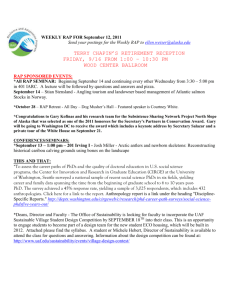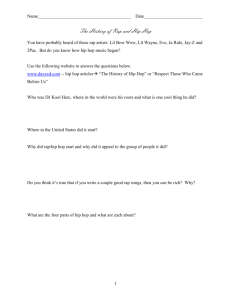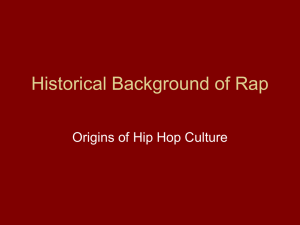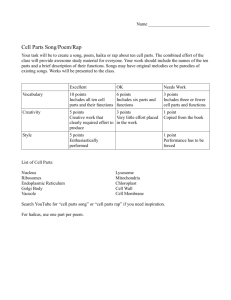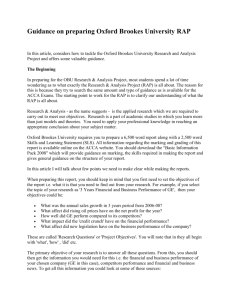File
advertisement
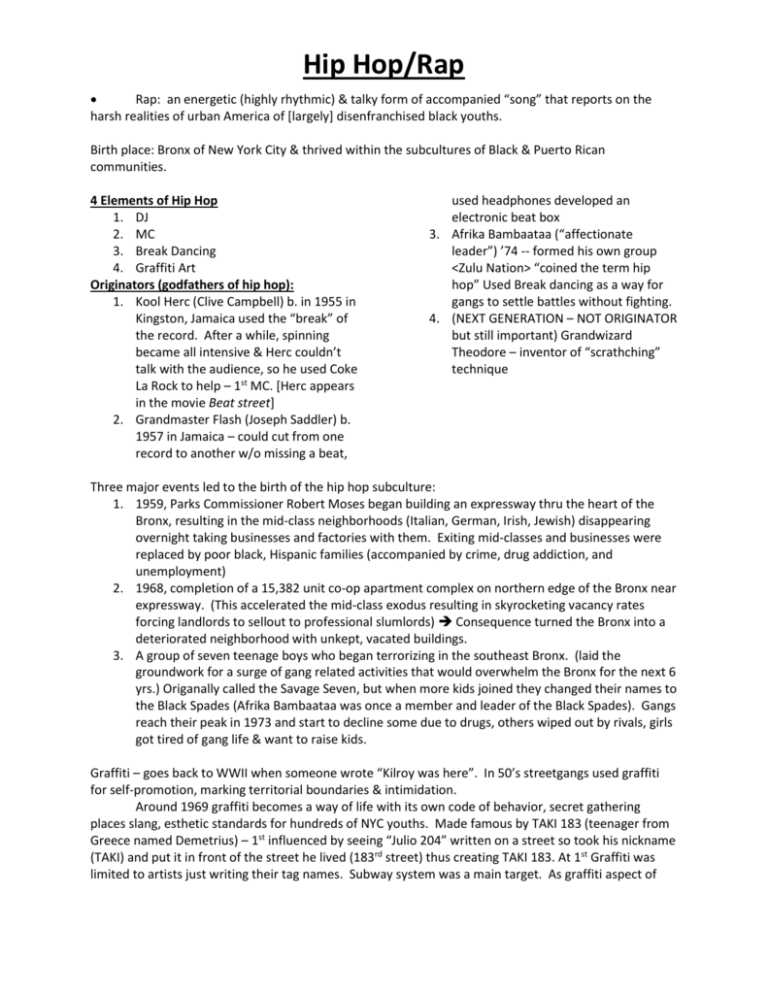
Hip Hop/Rap
Rap: an energetic (highly rhythmic) & talky form of accompanied “song” that reports on the
harsh realities of urban America of [largely] disenfranchised black youths.
Birth place: Bronx of New York City & thrived within the subcultures of Black & Puerto Rican
communities.
4 Elements of Hip Hop
1. DJ
2. MC
3. Break Dancing
4. Graffiti Art
Originators (godfathers of hip hop):
1. Kool Herc (Clive Campbell) b. in 1955 in
Kingston, Jamaica used the “break” of
the record. After a while, spinning
became all intensive & Herc couldn’t
talk with the audience, so he used Coke
La Rock to help – 1st MC. [Herc appears
in the movie Beat street]
2. Grandmaster Flash (Joseph Saddler) b.
1957 in Jamaica – could cut from one
record to another w/o missing a beat,
used headphones developed an
electronic beat box
3. Afrika Bambaataa (“affectionate
leader”) ’74 -- formed his own group
<Zulu Nation> “coined the term hip
hop” Used Break dancing as a way for
gangs to settle battles without fighting.
4. (NEXT GENERATION – NOT ORIGINATOR
but still important) Grandwizard
Theodore – inventor of “scrathching”
technique
Three major events led to the birth of the hip hop subculture:
1. 1959, Parks Commissioner Robert Moses began building an expressway thru the heart of the
Bronx, resulting in the mid-class neighborhoods (Italian, German, Irish, Jewish) disappearing
overnight taking businesses and factories with them. Exiting mid-classes and businesses were
replaced by poor black, Hispanic families (accompanied by crime, drug addiction, and
unemployment)
2. 1968, completion of a 15,382 unit co-op apartment complex on northern edge of the Bronx near
expressway. (This accelerated the mid-class exodus resulting in skyrocketing vacancy rates
forcing landlords to sellout to professional slumlords) Consequence turned the Bronx into a
deteriorated neighborhood with unkept, vacated buildings.
3. A group of seven teenage boys who began terrorizing in the southeast Bronx. (laid the
groundwork for a surge of gang related activities that would overwhelm the Bronx for the next 6
yrs.) Origanally called the Savage Seven, but when more kids joined they changed their names to
the Black Spades (Afrika Bambaataa was once a member and leader of the Black Spades). Gangs
reach their peak in 1973 and start to decline some due to drugs, others wiped out by rivals, girls
got tired of gang life & want to raise kids.
Graffiti – goes back to WWII when someone wrote “Kilroy was here”. In 50’s streetgangs used graffiti
for self-promotion, marking territorial boundaries & intimidation.
Around 1969 graffiti becomes a way of life with its own code of behavior, secret gathering
places slang, esthetic standards for hundreds of NYC youths. Made famous by TAKI 183 (teenager from
Greece named Demetrius) – 1st influenced by seeing “Julio 204” written on a street so took his nickname
(TAKI) and put it in front of the street he lived (183rd street) thus creating TAKI 183. At 1st Graffiti was
limited to artists just writing their tag names. Subway system was a main target. As graffiti aspect of
the Hip Hop subculture evolved graffiti writing groups start to form (ex: “Wanted” founded by TRACY
168 – streetwise white kid who was allowed to hang out with the Black Spades)
1976 – whole subway car murals start to appear. Lee Quinones (well known for subway car murals)
Transit Authority sees this as vandalism & establish a giant subway car wash in ’77 @ annual
cost of $400,000.
Lee decides to stop painting subway cars & start painting murals on handball
courts. (Handball graffiti originated with TRACY 168) His murals mingled cartoon imagery with strong
moral messages (i.e., end to the arms race, 10’ tall Howard the Duck coming out of a trash can saying “ If
art like this is crime, let G-d forgive me.”)
Fred Brathwaite approaches Quinones about painting murals for money – form a group <Fab 5>
- would paint murals $5/sq. foot. Attracted the attention of an Italian Art dealer (Claudio Bruni) invited
Fab 5 to submit 5 canvases for an art show in Rome. Canvases sell for $1,000 apiece.
Hip Hop continues to be a direct response to an older generation’s rejection of the values & needs of
young people. Direct response of the European watered down music that permeated the airways
(Disco).
Kurtis Blow – landed 1st major record label contract for a rap artist.
Knew how to work the crowd (“somebody scream”), had the look, but not a great rapper
Blondie’s lead singer - Patty Duke (punk/new wave) puts a tribute to Grandmaster Flash in one of her
songs.
Through television shows like Yo! MTV Raps & a succession of Hollywood movies, hip hop gained
millions of fans across America and spread to Europe, Asia, Afrca, etc…
BREAK DANCING
A colorful, acrobatic style of dance including headspins, backspins, etc… traces its roots to
African Martial Arts (Capoeta) – no one knows NY’s 1st break dancer but it was made popular by Zulu
Nation
RAPPING/MC-ING
Draws roots from Jamaican art form of toasting. Orginated when Dj’s could no longer deal with
records and still talk with the crowd. Eventually rappers would show off their skills by doing rhymes to
the tune of some popular song. The tune to Gilligan’s Island was often used.
DJ-ING (cutting & scratching)
Manipulation of a record over a particular groove. Extension of the “break” of the record.
Important songs:
Rapper’s Delight – Sugarhill Gang (1st big rap single, bass line taken from Good Times) Producer Sylvia
Robinson (R&B, RnR artist) hears this new underground sound and felt there was a market out there for
it. She forms group – not existing prior to her, Wonder Mike (Mike Wright), Big Bank Hank (Henry
Jackson), Master Gee (Guy O’Brien), Kory O. Controversy: Henry used Grandmaster Caz’s Rhymes, later
asks permission & gets it with the hopes that if he makes it big that he’d help out Grandmaster Caz &
Cold Crush, but then doesn’t
This Is the Message – Granmaster Flash & the Furious 5 (brings realism, social conscience to rap) ~ 1981
Walk This Way – Run DMC & Aerosmith (brought Rap to mainstream; Run DMC added elements of Hard
rock/Heavy Metal to their Rap – helps them “break into MTV” (Breaks open Rap-Rock and leads to
groups like “Faith No More”)
Run DMC = Joseph Simmons (Run) b. 11/15/64; Darryl McDaniels (DMC) b. 5/31/64; Jason Mizell
(Jam Master Jay) b 1/21/65 – d. 10/30/02m – Break into MTV performing hip hop with Led Zeppelin-like
guitar & Rap. MTV’s exec’s love it. Only other black artist on MTV @ the time was Michael Jackson.
No Sleep til Brooklyn – Beastie Boys (1st significant white rappers) ~1986
Ice Ice Baby – Vanilla Ice (“poser” trying to cash-in; steals David BowieQueen Under Pressure music) ~
1988
2 Live-Crew Me So Horny- (1989): Tipper Gore (wife of then senator & later VP Al Gore) was
instrumental in getting “Parenta Advisory Stickers” on CD’s – brings a wall into the face of Hip Hop &
stops the good music from being played
Fight the Power – Public Enemy (very political group, preaches black power: stand together to fight
white oppression, gov, etc) – tries to start a revolution (civil rights) also songs like 911 is a Joke –
continues the political and rights of free speech
Colors – Ice T (movie in 1988/89? - Starring Sean Penn, Robert Duval as cops in LA [Compton]) (shows
violence between blood & crips)
Push It – Salt n Peppa (1st significant female rap artists – shows that girls have to “sell themselves” in
order to become rap stars…[fun rap/dance music] {song sample from James Brown “Say It Loud, I’m
Black & Proud”
Dear Mama – Tupac Shakur (prison inmate/deathrow letter to mom) expression of himself?
You Owe Me – Nas featuring Gin-u-wine (modern rap/hip-hop) – equates women owing sexual favors
for driving cars, wearing jewelry (equates women to slavery)
You Must Learn – KRS-ONE {Knowledge Reigns Supreme Over Nearly Everyone –aka- Kris Parker} (Plea to
blacks to learn their own history, become educated)
Forogot about Dre – Dr. Dre (with Eminem) (back in the scene) brilliant businessman ~ 2000
Stan – Eminem with Dido (letter to artist; murder/suicide; accident – shows the influence artists have
over their fans)
Gangsta Rap (seen as a way by artists like Dr Dre and Ice Cube to capitalize on the fact that people want
to consume the worst possible images of black people.) Scarface text is all through Gangsta Rap
N.W.A. (Niggaz Wit’ Attitude) – instigated hip-hop’s “gangsta era”
o Eazy-E (Frontman, drug dealer turned rapper-Eric Wright)
o Ice Cube (future rap superstar-O’Shea Jackson)
o Dr. Dre (producer, DJ)
o MC Yella (Antoine Carraby)
o MC Ren (Lorenzo Patterson)
Debut album, Straight Outta Compton, was a shocking counterpoint to East Coast hip-hops emerging
Afrocentric, politically conscious tendencies. Brought forth messages of street violence, crime,
misogyny (hatred, dislike, or mistrust of women). They wore baggy “prison blues”, silver & black colors
of bad-boy L.A. Raiders and unfashionable Jheri-curl hairstyles.
Went platinum with minimal radio play gaining mainstream attention when the track Fuck tha
Police was condemned by the 200,000 member national Fraternal Order of Police and a representative
of the F.B.I. Ice Cube leaves group shortly after its release due to financial disputes.{goes to NY & begins
recording with Public Enemy’s production team.} Dr Dre leaves in ’92 to pursue a solo career and the
group falls apart. (1st solo album The Chronic, establishes him as the premier hip-hop producer of the
90’s, setting the pace for hardcore rap. Gangsta rap establishes itself as the most popular form of hiphop in the 90’s.
Rap artist, Jay-Z, stabs someone at a party to “keep it real”.
Tupac Shakur – b. Brooklyn, NY 1971, moved to Baltimore, MD & attends the Baltimore Schol for the
Performing Arts. Moves to Oakland, CA and starts to “hang with the wrong crowd”. Joins rap group,
Digital Underground, 1st as a tour dancer then rapper. Maintained a thug image, had several movie roles
Juice, and eventually (his highlight) Poetic Justice beside Janet Jackson, but his acting career gets cut
short when he is charged with assaulting the director of Menace II Society after being dropped from the
cast. Goes in and out of courthouses and jail cells for assault, charges of shooting 2 off duty Atlanta
police officers (charges are later dropped), brought up on sexual assault charges and is shot 5 times
while in a recording studio in NY. Accuses Sean “Puffy” Combs and Notorious B-I-G of setting him up.
Spent 8 months in prison before Death Row Records producer Suge Knight pays his $1,000,000 bail.
Repays them by becoming their most valuable rapper.
September 7, 1996, 2Pac & Suge leave the Mike Tyson/Bruce Seldon fight in Las Vegas. The car
was ambushed by another, Tupac is hit 4 times. After 6 days in critical condition, on September 13 he
dies. He was only 25. Suspicion that it could have been the rivalry between the West and East Coast
Rappers.
Other resources: Hip Hop & the Beat Don’t Stop video, Scratch DVD, FRESH DVD, NY 77 video

